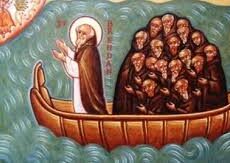
For the past few weeks news in Ireland has been focused on actions to facilitate the flow of goods across Northern Ireland’s border. The story of why this border was created can be told by telling the story of one man, Michael Collins. This is his story.
Michael Collins was born in 1890 in Woodfield, County Cork, the youngest of eight children. He moved to London in 1906 to become a clerk in the Post Office Savings Bank at Blythe House. He returned to Ireland in January 1916 and fought in the Easter Rising. He was taken prisoner and released with many others in December 1916. Collins first began to emerge as a major figure in the vacuum created by the executions of the 1916 leadership. He began hatching plans for “next time.”
Collins subsequently rose through the ranks of the Irish Volunteers and Sinn Féin in the guerilla war against the British that followed the Easter Rising. He gained fame as a guerrilla warfare strategist, planning many successful attacks on British forces. In one attack he planned and executed the “Bloody Sunday” assassinations of key British intelligence agents. Collins was determined to avoid the massive destruction, military and civilian losses for merely symbolic victories that had characterized the 1916 Rising. Instead, he directed a guerrilla war against the British, suddenly attacking then, just as quickly, withdrawing, minimizing losses and maximizing effectiveness.
By October 1917 Collins had risen to become a member of the executive of Sinn Féin and director of organization for the Irish Volunteers. Éamon de Valera, another veteran of 1916, stood for the presidency of Sinn Féin against Arthur Griffith, who stepped aside and supported de Valera’s presidency. Collins was elected as a delegate for South Cork in December 1918. Sinn Féin’s elected members formed an Irish parliament in January 1919 and declared the independence of the Irish Republic. In the ensuing War of Independence, Collins was Director of Organization and Adjutant General for the Irish Volunteers, and Director of Intelligence of the IRA.
After the July 1921 ceasefire, Collins was sent to negotiate peace terms in London at the request of Éamon de Valera. In July, Lloyd George’s government offered a truce. Arrangements were made for a conference between British government and the leaders of the yet-unrecognized Republic. There remains uncertainty as to the two sides’ capability to have carried on the conflict much longer. Collins told Hamar Greenwood after signing the Anglo-Irish Treaty: “You had us dead beat. We could not have lasted another three weeks. When we were told of the offer of a truce we were astonished. We thought you must have gone mad.” As he signed the agreement he said, “I believe I’m also signing my own death warrant.” However he stated on the record that “there will be no compromise and no negotiations with any British Government until Ireland is recognized as an independent republic. The same effort that would get us Dominion Home Rule will get us a republic.”
The resulting Anglo-Irish Treaty, signed in December 1921, would establish the Irish Free State but depended on an oath of allegiance to the Crown. This was the clause in the treaty de Valera and other republican leaders found hardest to accept. Collins viewed the treaty as offering “the freedom to achieve freedom”, and helped persuade a majority of the Parliament to ratify the treaty. A provisional government was formed under his chairmanship in early 1922. During this time he secretly provided support for an IRA offensive in Northern Ireland. It was soon disrupted by the Irish Civil War, in which Collins was commander-in-chief of the National Army. He was shot and killed in an ambush by anti-Treaty forces on 22 August 1922. Michael Collins was succeeded by Richard Mulcahy. The Civil War ended in victory for the government forces, with anti-Treaty forces dumping their arms in May 1923.
The Northern Ireland border stands today as it did a century ago. The republican victories would have been impossible without widespread support from the Irish population, which included every level of society and reached deep into the British administration in Ireland. In May 1921, elections were held in the Northern part of Ireland under the 1920 Government of Ireland Act which separated the governance of six counties in Ulster from the rest of Ireland. This leads us to Irish math today: 26 + 6 = 1: a united Ireland.
De Valera is alleged to have declared in 1966, “It is my considered opinion that in the fullness of time history will record the greatness of Michael Collins; and it will be recorded at my expense.”



